January 13, 2015
Edited by David Sanders
Specimen Days
1562 – Mark Alexander Boyd, Scottish poet (d. 1601), is born.
1812 – Victor de Laprade, French poet and critic (d. 1883), is born.
1859 – Kostis Palamas, Greek poet (d. 1943), is born.
1599 – Edmund Spenser, poet (Faerie Queene), dies at about 46.
1702 – Peter Rabus, Dutch poet/translator (Great Name Book), dies at 41.
1960 – Sibilla Aleramo, [Rina Faccio], Ital poet (Una Donna), dies at 83.
1974 – Salvador Novo, Mexican writer and poet (b. 1904), dies.
1995 – Maxwell Henley Harris, Austrian poet/publisher (Critics), dies at 73.
2009 – William DeWitt Snodgrass, American poet (b. 1926), dies.
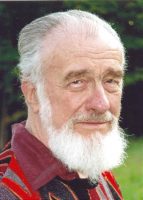
The house still stands, locked, as it stood
Untouched a good
Two years after you went.
Some things passed in the settlement;
Some things slipped away. Enough’s left
That I come back sometimes. The theft
And vandalism were our own.
Maybe we should have known.
—from “A Locked House” by W. D. Snodgrass (1926–2009)
“The theft / And vandalism were our own. / Maybe we should have known.” – W. D. Snodgrass
World Poetry
How Wordsworth Informed the Poetry of the Arab Spring
The excitement that accompanied the beginning of the Arab Spring has now largely died down, as a timeworn truth reiterates itself: when an oppressive power is toppled, a similar or worse one will often take its place. Situations of this kind will be familiar to most. Inspired by an outbreak of protests against police and government brutality in Tunisia in late 2010, neighbouring countries were swept into a wave of unrest that lead to the ousting of many long-established autocrats. In almost every case this tide of humanitarianism reversed when the protesters turned against one another, or militants stepped into the power vacuum.
David Harsent Wins TS Eliot Prize for Poetry for Fire Songs
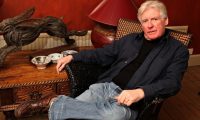
After four previous appearances on the shortlist for the TS Eliot prize for poetry, David Harsent has finally taken the honour for his 11th collection of poems, Fire Songs. He was described by the chair of the judging panel, the poet and novelist Helen Dunmore, as “a poet for dark and dangerous days”. She added: “Fire Songs plumbs language and emotion with technical brilliance and prophetic power.”
David Harsent has won the TS Eliot Prize for Poetry.
Recent Reviews
Paul Muldoon. . . Favouring Mystification over Meaning

by John Boland
For more than four decades, Paul Muldoon has been the most intellectually teasing and technically gifted of Irish poets. And, it must be said, often the most obscurantist, too. So not exactly a Philip Larkin, a Wendy Cope or even a Seamus Heaney, all of whom can be readily comprehended by the intelligent common reader. Poetry, of course, doesn't always have to be "easy", but when an alert reader who scrupulously submits to a poem four or five times and still hasn't the foggiest what it's about, it seems reasonable to assume that the fault may possibly lie with the poem rather than with the person struggling to understand it.
'Digest,’ 'Slant Six,’ 'I Was Not Born’
by Stephen Burt
Gregory Pardlo has a lot to say, and not just about his own life: Digest (Four Way; $15.95) is dense with the kind of ambitiously abstract language designed to explain, or dissect, ideas, and it is Pardlo’s gift to turn that language into ironic, skeptical, personal poems, either by slicing it up into unlikely rhythms, or by immersing it in daily life. An 18th century politician finds “the value of tranquility proportionate / to the power one has to gerrymander the metaphor”; two pages later, “I finally friended my brother.” Both sentences ask if we are our brothers’ keepers, if a nation can be like a family — and “Nothing / holds a family together like irony and a grudge.”
‘Sailing the Forest: Selected Poems,’ by Robin Robertson

by Jeff Gordinier
It’s impossible to talk about the poetry of Robin Robertson without talking about sex, but to do so is to slip into perilous waters. And by “waters” I mean a hot tub. Because you can’t bring up sexy poetry without thinking of Roger and Virginia Klarvin, the randy and dithyrambic professors (played by Will Ferrell and Rachel Dratch) who always seemed to be in the middle of a steamy soak on “Saturday Night Live.” If even the most masterly fiction writers botch the job of describing the erotic act, it’s more challenging still for poets. One false move and they run the risk of sounding like Mr. Klarvin, the grandiloquent scholar and “love-ah” who proclaimed, in one episode, that “beneath the surface of these very waters a virtual ant farm of activity is taking place.”
No to Aristotle
Marvelous Things Overhead, Ange Mlinko
by Rowan Ricardo Phillips
This is a book I adore, but I feel compelled to begin with a complaint: when Ange Mlinko goes to such lengths to point out Aristotle's presence in Marvelous Things Overheard, evoking him rather unnecessarily in both her epigraph and in the concluding notes ("A selected bibliography would include Aristotle's treatises 'On the Naming and Situation of the Winds' and 'On Marvelous Things Heard'''), I cringe and feel more than a slight tinge of misplaced cultural authority attempting to bookend this lovely work.
For more than four decades, Paul Muldoon has been one of the most gifted of Irish poets.
Broadsides
When T.S. Eliot Invented the Hipster

by Karen Swallow Prior
January 4 marks 50 years since the death of poet T. S. Eliot. This year also marks the 100th anniversary of one of Eliot’s most famous poems, “The Love Song of J. Alfred Prufrock,” the work that thrust Eliot onto the modernist stage. An embodiment of turn-of-the century angst wrought by a world sucked dry by skepticism, cynicism, and industrialism, Prufrock bears striking similarities to a subculture of mostly white, urban, detached-yet-sensitive young adults at the cusp of our own century. One might say Eliot invented the hipster.
Sleights of Word
by Daniel Westover
You probably remember Mallarme’s response when Degas told him he had a great idea for a poem: ‘Alas, my dear, poems are made of words, not ideas.’ Of course there are ideas in poems, but I much prefer it when ideas come after poems. That is, I don’t want my first encounter with a poem to stimulate my intellect. I want that first encounter to be musical and physical and always verbal. R. S. Thomas writes that ‘Poetry / is a spell woven / by consonants and vowels // in the absence of logic’ … ‘Poetry is that / which arrives at the intellect / by way of the heart.’ With all due respect to R. S., I might modify this a little, at least for myself. For me, poetry arrives at the intellect by way of words, as the product of their chemical reaction. For me, a poem’s meaning is its aftermath. The poets I most admire are more than in command of language. They are also in awe of it, treating words like strange and wondrous pebbles just turned over on a beach.
More Reasons Why the Greek Poet Homer May Never Have Existed
by Terrence McCoy
Nearly 200 years ago, a French painter created what would become a famous depiction of the Greek author Homer. In it, Homer looks like a pretty big deal. In the shadows of the Pantheon, he’s ensconced among a throng of muscle-bound specimens draped in robes, one of whom is playing the harp. “Homer, in this view, was the product of a new, dynamic, politically inventive and culturally burgeoning moment in Greek history,” writes historian Adam Nicolson in a new book on Homer. “Homer was the poet of a boom.” But this image of Homer, Nicolson said, is inaccurate. The painting glorifies all the antiquated theories that held that Homer was a blind, illiterate genius poet who singlehandedly created two of the greatest stories in human history, the Odyssey and the Iliad. As appealing as that portrayal may be, it’s most likely not true. Homer perhaps never even existed — or, at least, he was nothing like he is often portrayed.
The Web Poet's Society
Can an online course revive interest in the classics?
by Kristina A. Bicher
It’s 3 a.m. and the emails are coming in fast and furious. My iPhone is pinging like a Vegas slot machine that’s come up all cherries. What’s the emergency? I had just joined a discussion thread for a popular online poetry class—ModPo—and Emily Dickinson’s "Volcanoes Be in Sicily" is the subject of hot debate. Within 24 hours, there are over a hundred posts about this poem alone: "Why the archaic use of 'be'?" "What of the perplexing 'lava steps'?" One participant lapses into German and has started a discussion group in Switzerland. Another gushes, "ModPo=cyber peyote."
TS Eliot: The Poet Who Conquered the World, 50 Years On
by Robert Crawford
It’s 2015, the year of the Bullshit Centenary. One hundred years ago a young immigrant poet submitted his poem “The Triumph of Bullshit” for publication in a London avant‑garde magazine. The editor’s letter explaining his rejection of the work makes clear he decided to “stick to my naif determination to have no ‘Words ending in -Uck, -Unt and –Ugger’.” Probably the word “bullshit” was imported from the poet’s native US; but so far no one has found “bullshit” in print as a single word before 1915. The young immigrant poet thought the rejection of his poem disappointingly puritanical. He was finding it hard to get his verse into print. Four years earlier, at the age of 22, he had completed his first masterpiece. Though he had shown it to a few friends in the US and had read it aloud to fellow students in England, in January 1915 it remained unpublished. At least one editor considered it borderline insane; another was “unable to make head or tail” of it. Its title was “The Love Song of J Alfred Prufrock”.
Is Eliot’s Prufrock the original “hipster”?
Drafts & Fragments
A Videogame That Teaches You to Write Poetry, Even if It Intimidates You

by Bryan Lufkin
Videogames and poetry haven’t always gone hand in hand.
We’re still a long way from Master Chief breaking into a Coleridge soliloquy. But game developers Ichiro Lambe and Ziba Scott have edged us a bit closer to that day with Elegy for a Dead World, a game they Kickstarted in October and released on Steam last month. Elegy lets players write prose and poetry as they explore distant planets and dead civilizations. The player faces 27 challenges in three worlds, each riffing on a specific British Romance-era poem: “Ozymandias” by Percy Bysshe Shelley, “When I Have Fears That I May Cease to Be” by John Keats, and “Darkness” by Lord Byron.
The 10 Most Anticipated Poetry Books of 2015
by Jonathon Sturgeon
Although many books aren’t slated until later in the first quarter, 2015 is already shaping up to be a major year for American poetry, especially with the return of favorites like Mary Jo Beard, new collected works from masters like Jorie Graham, and a book from perhaps our greatest living poet, John Ashbery. Add to this mix the rediscovery (or first translation) of forgotten yet undeniably major poets like Alejandra Pizarnik and the arrival of younger poets like Uljana Wolf, and it’s clear that poetry in America is firing on all cylinders.
Poems on Ebola

PEN Sierra Leone has run school clubs since 2007 and there are now PEN clubs established in 50 schools across the country’s four regions to promote the importance of reading and writing. Schools are currently closed in Sierra Leone due to the ebola outbreak and PEN Sierra Leone colleagues are working in collaboration with partner organisations to try to help bring books to the homes of children during the public health emergency period. Some of the students have written poems and stories about ebola, which you can read below.
The video game Elegy for a Dead World lets players pen poetry as they explore distant planets & dead civilizations.
Poetry In the News
State's Poet Laureate Won't Be Part of Haley's Inauguration

A long standing inauguration tradition will be absent from next week's ceremony at the Statehouse. In years past, South Carolina's poet laureate read a poem during the governor's inauguration. But the current poet laureate, Marjory Wentworth, says she was not invited to the event — even though she spent the better part of December writing it. Wentworth says she's not taking the decision personally, though. The governor's office said in a statement Friday night that there just was not time to include a reading of Wentworth's poem in the inaugural schedule.
Claudia Emerson Collection to Be Released Posthumously in March 2015

In March of 2015, Louisiana State University Press will publish Claudia Emerson’s The Opposite House. According to the official press release, The Opposite House “explores the harsh realities of aging and the limitations of the human body, as well as the loneliness, fear, and anger that can accompany us as we live.”
South Carolina’s poet laureate won’t be a part of the upcoming gubernatorial inauguration ceremony.
New Books
Sugar Run Road by Ed Ochester
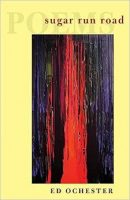
[Paperback] Autumn House Press, 82 pp., $17.95
How often do you read a book of poetry that is first and foremost enjoyable? Ed Ochester opens Sugar Run Road by praising Pittsburgh's deep grammar and inner mystery (a chuckle in itself) and ends with his wife "feeding sparrows/ in winter which God doesn't do too well." In between, as a practical Romantic, he romps through rich anecdotes and meditations on poets and poetry, family, American history, work, war, Bach and Mozart, Hemingway and the Emperor Nero, and much more. Ochester's love of the art of poetry, married to his love of the common material world, gives birth to serious fun and wisdom. I'm so happy to have this book. —Alicia Ostriker
Station Zed: Poems by Tom Sleigh
[Paperback] Graywolf Press, 96 pp., $16.00
Station Zed is theterminal outpost beyond which is the unknown. It is also the poet Tom Sleigh’s finest work. In this latest collection, Sleigh brings to these poems his experiences as a journalist on tours of Lebanon, Somalia, Iraq, and Libya. But these are also dispatches from places of grief, history, and poetic traditions as varied as Scottish ballads and the journeys of Bashō.
Tablature by Bruce Whiteman

[Paperback] McGill-Queen's University Press, 94 pp., $14.95
From the "rubble [that] is the order of the day" in the opening poem to the longing for a "radiant happy ending" in the book's final line, Tablature is a book of poems that traverses a great swath of the heart's experience in compelling and lucid poetic language. Bruce Whiteman's first book of poems in traditional lined form in thirty years is by turns learned and allusive, and emotionally expressive and despairing. These poems engage three large and powerful subjects: the landscapes we see and abide in, music that is comforting and a guide to hearing the poem's compulsions, and love – erotic, domestic, and enduring.
A Stranger's Mirror: New and Selected Poems 1994-2014 by Marilyn Hacker
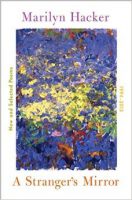
[Hardcover] W. W. Norton & Company, 320 pp., $29.95
Drawing on two decades worth of award-winning poetry, Marilyn Hacker’s generous selections in A Stranger’s Mirror include work from four previous volumes along with twenty-five new poems, ranging in locale from a solitary bedroom to a refugee camp.
In a multiplicity of voices, Hacker engages with translations of French and Francophone poets. Her poems belong to an urban world of cafés, bookshops, bridges, traffic, demonstrations, conversations, and solitudes. From there, Hacker reaches out to other sites and personas: a refugee camp on the Turkish/Syrian border; contrapuntal monologues of a Palestinian and an Israeli poet; intimate and international exchanges abbreviated on Skype—perhaps with gunfire in the background.
Loose Strife by Quan Barry
[Paperback] University of Pittsburgh Press, 72 pp., $15.95
In poems initially inspired by Aeschylus’ fifth-century trilogy “The Oresteia,” which chronicles the fall of the House of Atreides, Loose Strife investigates the classical sense of loose strife, namely “to loose battle” or “sow chaos,” a concept which is still very much with us more than twenty-five hundred years later.
Ed Ochester’s “Sugar Run Road” romps through rich anecdotes and meditations on poetry, family, and more.
Correspondences
Mark Strand, 1934-2014
by David Yezzi
Death is so consistently on the lips of poets—either in so many words or in more veiled terms—that the death of the poet himself might come as something less than a shock, an eventuality amply provided for by the tenor of the poems. Yet when Mark Strand died, at eighty, in late November, after a battle with cancer, it struck a deep chord among poets and readers, for whom he was one of the signal voices of the late twentieth century.
Phoenix Poet Myrlin Hepworth: "The Poetics of My Time Are in Hip-Hop"

by Glenn BurnSilver
Poet, rapper, hip-hop artist, educator, activist, and community leader are but a few of the titles that define Phoenix resident Myrlin Hepworth, who got his start doing slam poetry on Mill Avenue while simultaneously studying English at Arizona State University. As Hepworth sees it, it was something of a double major. "While I was doing slam poetry on Mill Avenue — literally, on the street, the unaccredited school — I [was] going to ASU and studying formal writing and what makes a compound sentence and why Faulkner and Hemingway are opposite ends of the same movement, and stuff like that," says Hepworth, also a Phonetic Spit co-founder.
Myrlin Hepworth is a Phoenix-based poet, rapper, hip-hop artist, educator, activist, and community leader.
Envoi: Editor’s Notes
Lessons from the Past: Miller Williams
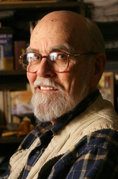
We begin to dwarf the natural poetic impulse of children – if there is one, and I'm inclined to believe that there is – before they ever get into school, as when a child runs into the house saying, "Hey, there's a lion in the yard!" and we say, "Don't be silly, that's a dog. You know the difference between a dog and a lion." The child has just done what a poem does. To the child, the thing in the yard was not a dog. It was a lion, because looking at it the child felt "lion" not "dog." The child senses that the dimensions of a thing are not the essence of a thing, that what something does to us is part of its essential nature, and so a child describes a thing in terms of its effects. So does a poem. The poet and the child are interested not in how many feet there are to a mile but in how many steps there are.
—from “Nobody Plays the Piano, but We Like to Have It in the House”
“We begin to dwarf the natural poetic impulse of children before they ever get into school.” – Miller Williams